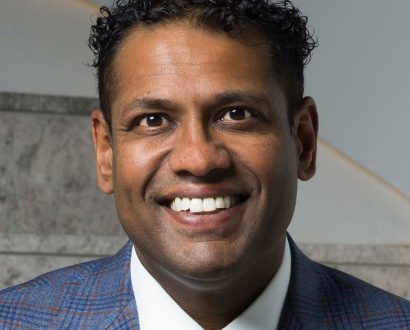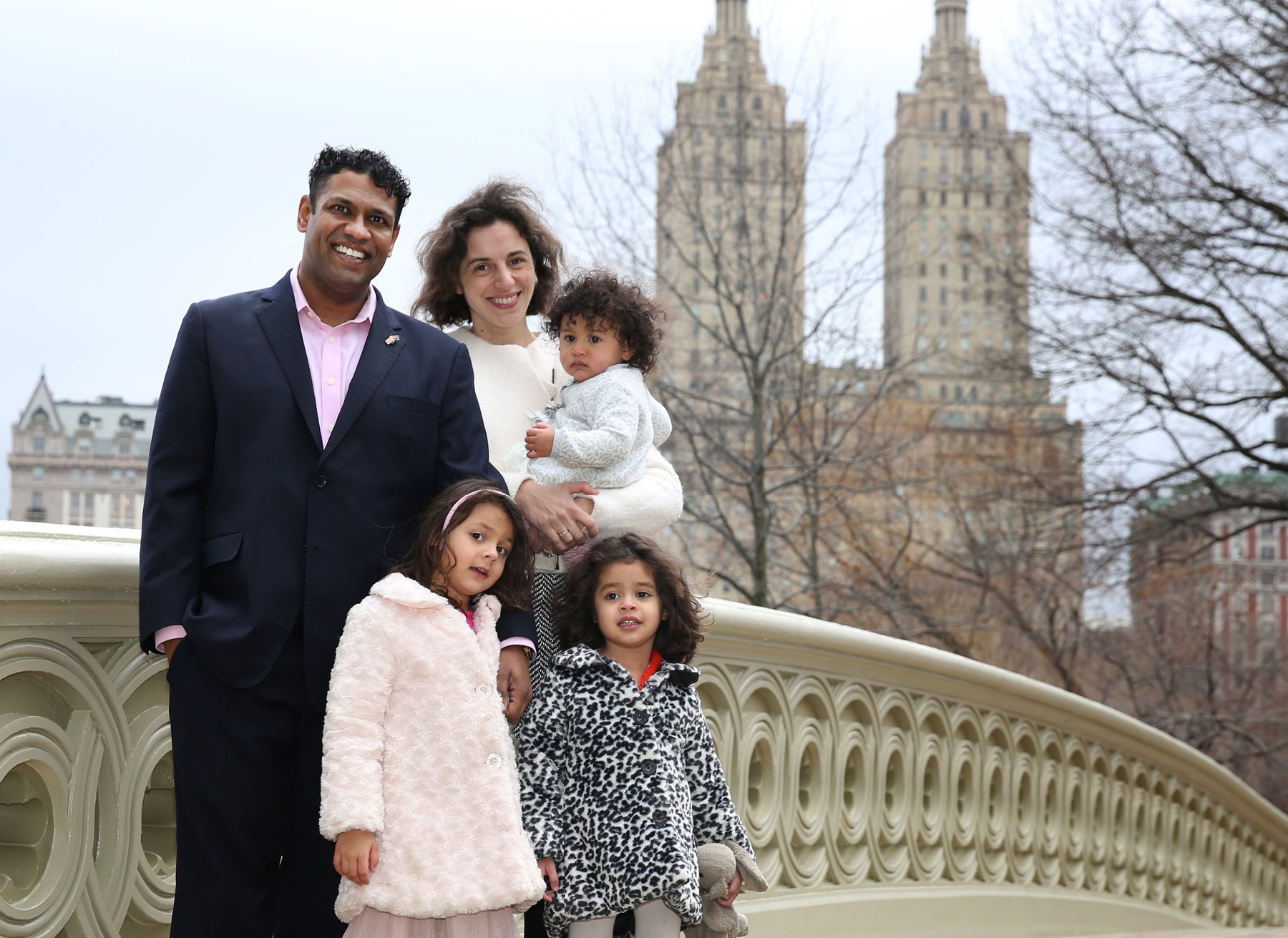Prescription for change: Vinay Rane

Vinay Rane never set out to be a doctor. Raised in Melbourne in a family of Indian heritage, he jokes that his parents only had two acceptable career paths in mind for him – prime minister or captain of the national cricket team.
Lacking an interest in politics and only being average at cricket, he found himself studying both medicine and law at university, unsure what his future would look like but driven by a desire to be useful and make a difference.
"It’s one of the joys of life, right? We all have goals to achieve. But often, life takes its own direction. Most of us tend to fall on our feet one way or another," he tells The CEO Magazine.
"But the reality is, I really had no vision as to where I wanted to go. I just felt a need to be useful, and I wanted to make a difference."
Building a practice with heart
That desire led him to co-found Melbourne Mothers, a women’s health practice in the heart of Melbourne that he runs with his wife, Christine Sammartino. Their journey together started, as he puts it, at the romance capital of Australia – Warrnambool Base Hospital.
"She was an intern, and I was a junior doctor," he muses. "I offered her a lift home one day, and we just sort of hit it off and never looked back."
Their shared experience working in regional and rural Australia shaped their vision for Melbourne Mothers, he says.
"We wanted to bring country values to the city as a husband-and-wife team, where our family is truly there for our patients and their families," he adds.


Today, the practice embodies a community-driven approach to healthcare that prioritizes long-term relationships over the more transactional care that is often found elsewhere.
And unlike many doctors who prefer to keep their professional and personal lives separate, Rane and his wife have embraced a more integrated approach.
"We deliver babies and look after women during pregnancy and at different stages of their lives, so what we do is naturally a very family-friendly style of medicine," he points out.
"We encourage our patients to bring their families along with them. Our kids – and even our dogs – are often at our practice, which our patients really seem to enjoy."
Compassionate excellence
With this ethos of compassionate excellence embedded into the very DNA of Melbourne Mothers, it comes as no surprise when Rane shares that their patients are more than just names on a chart.
"They’re people we know, people we see at the supermarket, in the community, living their best lives. That’s what makes what we do so rewarding," he says.
The husband-and-wife duo’s combined expertise – Rane’s specialization in obstetrics and gynecology and his wife’s expertise in nephrology and obstetric medicine – means they can offer comprehensive, seamless care for women throughout their lives.
"The thing that really hits home is our ability to provide not just that continuity of care, which is of course important, but our ability to provide personalized, tailored and individual care plans for our patients to make sure they can be the best they can possibly be. That has always been really important to us," he insists.
"And that’s not something that’s always easy to deliver in healthcare, particularly in the public sector, because we’re often looking after a huge number of people on limited resources. However, at our practice, we know our patients really well. We know what their social circumstances are like. And to that end, we are well equipped to create a very personalized, tailor-made care plan for them that’s going to work."
Expanding the impact
Rane’s drive to improve healthcare doesn’t stop at Melbourne Mothers. He sits on advisory committees for both Ramsay Health Care and St. Vincent’s Private and is on the council for the Australian Medical Association and the National Association of Specialist Obstetricians and Gynaecologists. Excitingly, he’s also leading the development of a new hospital in Melbourne’s inner north, set to open in the next 12–18 months.
"It’s been a real game-changer – finding the best location, securing the property, partnering with people that have a similar value structure that really want to make a difference, see change for the better and encourage other groups to do the same thing," Rane beams.
"They see what we are doing and that has become the new benchmark. It’s deeply rewarding, seeing how we’re influencing other groups to strive to do more with less."
That influence is now extending overseas. "This year, we’ve been heavily involved, particularly with the Middle East, in trying to expand our footprint through that corridor," he explains.
Rethinking fertility care
However, one of Rane’s most ambitious projects is Thrive Fertility – a clinic born out of frustration with an industry dominated by offshore private equity firms, where patients often feel like little more than numbers.
"My business partners and I saw a gap in the market," he explains. "Many of the IVF providers don’t keep the patient at the center of the universe all the time, which is what we really want to do," he explains.
By leveraging strong partnerships, Thrive Fertility offers high-end care at half the price of other premium providers, without compromising on quality.
"It was important to us to provide exceptional high-end fertility care, but at a cost point that was going to be accessible for more people. And thankfully, by partnering with groups like Ramsay, we’re situated within the hospital itself, so there are advantages – we don’t have to transport eggs, and we have access to a AAA-rated theater, for example," he notes.
"We sourced the best of everything, including the best staff. And we’ve also invested in AI to identify which embryos, for example, are most likely to result in taking a baby home.
"We’re proud of what Thrive has managed to do in its first year, and we want to expand on that."
Medicine as a passport
Medicine hasn’t just been a career for Rane; it’s been a gateway to new cultures, traditions and ways of working.
"I’ve been fortunate in that I’ve been able to use medicine as my passport to see the rest of the world," he says.
"And that started very early on as a medical student. I was able to go overseas for electives for periods of time, and I also got to see parts of Australia that I would have never had exposure to otherwise."
He shares that it’s taken him to South-East Asia, where he continues to still do some work, as well as the United Kingdom, the United States, Europe and Scotland, as a Churchill Fellow.
"I undertook a Fulbright scholarship where I worked with the United Nations, the Obama White House and the Mayo Clinic. Then I finished up at Harvard University where I took on a role as international faculty for Postgraduate Medical Education. These experiences truly made the world a much smaller place for me," he reveals.
Visiting each place also opened his eyes to a world of possibility.
"I’ve gained an appreciation of just how fantastic everybody is in their respective environments. I mean, I’ve seen productivity levels that would blow our minds, particularly in South-East Asia on very low resourcing capacity," Rane says.
"And similarly, it’s been an absolute eye-opener, seeing what humans are capable of doing when we put our minds to it and there’s seemingly an unlimited budget like we see in the United States."
A wise investment
Beyond practicing medicine, Rane is quick to point out that healthcare is one of the smartest investments anyone can make.
"Healthcare is where all the chickens come home to roost when there’s an economic downturn," he says. "Every financial advisor will tell you that healthcare is recession-proof.
"And what they’re really trying to say is that healthcare is relatively low risk in the sense that health is important to everybody in the community. And it’s not at all adversarial because our patients always want exactly the same outcome that we want. We want to demonstrate excellence in healthcare, whether that’s motivated by our ego or a more compassionate view.
"The other thing about healthcare is that, as an investor, it makes you feel good because the work goes well beyond financial performance as a singular metric. It’s really about making a tangible difference in people’s lives. Day to day, that reward is immediate."
At a time when people are living longer but struggling with chronic illnesses like diabetes, heart disease and dementia, demand for healthcare is only growing.
"We live with all these chronic problems, including cancer and dementia, so our requirements in the health sector have massively increased, but we just refuse to die because our medical advancements have gotten to a point where we can prolong life," he points out.
"Now, we need to concentrate on the quality of life. So things like orthopedics, cancer care, aged care, mental health and fertility services – these are areas of significant growth and will continue to grow in the future."
That growth, however, comes with contradictions.
"Healthcare is a flawed business model," Rane jokes. "We spend our careers trying to put ourselves out of business, developing treatments to replace surgery and promoting preventive care. And we train our future competitors for free because it’s the right thing to do. No other industry works like that.
"But it’s a very low-risk investment environment. You feel great about it. It keeps your brain constantly ticking over as well because there are always going to be advancements in healthcare. The enemy of good is better, and we’re constantly striving for that. And that’s what I really like about this field is that you are always learning. If I’m doing the same thing the same way in five years, then I’ve absolutely failed."
Fueled by frustration
Despite his passion for medicine, Rane admits he’s also fueled by frustration, particularly when it comes to women’s health. He’s seen firsthand how their health issues are often sidelined in medical research and funding.
"My patients are so smart. These women are incredibly health literate. By the time they come and see me, they’ve often researched their own issue to the nth degree. They keep me on my toes," he admits.
But despite this growing health literacy among women, many conditions affecting them – like endometriosis, polycystic ovary syndrome and menopause-related issues – remain underfunded and under-researched.
"If these were men’s diseases, we’d already have a cure," Rane says, bluntly. "We are very good at putting our best minds together and coming up with that solution. Heck, we’re looking at landing people on Mars.
"It, therefore, staggers me as to why we can’t find a cause or a decent treatment for preeclampsia or endometriosis – because that’s far more important than putting people on Mars. We have very good technologies, to the point where we can give a 90-year-old man an erection. Yet, we still can’t fix women’s problems."
The quiet victories
For Rane, success isn’t measured in financial performance or accolades. Instead, it’s in the quiet victories. It’s the woman who thought she’d never conceive but walks out of Thrive Fertility with a baby on the way. It’s the patients who stop him on the street to say hello. It’s in the doctors he mentors who will one day surpass him in both skill and knowledge.
At its core, his work is about making healthcare personal. It’s about ensuring that every patient, regardless of their circumstances, gets the best possible care.
"When I look at my patients and think – what if this was my wife? My daughters? My sister? My mother?" he reflects. "And suddenly, making the right decisions becomes very easy."